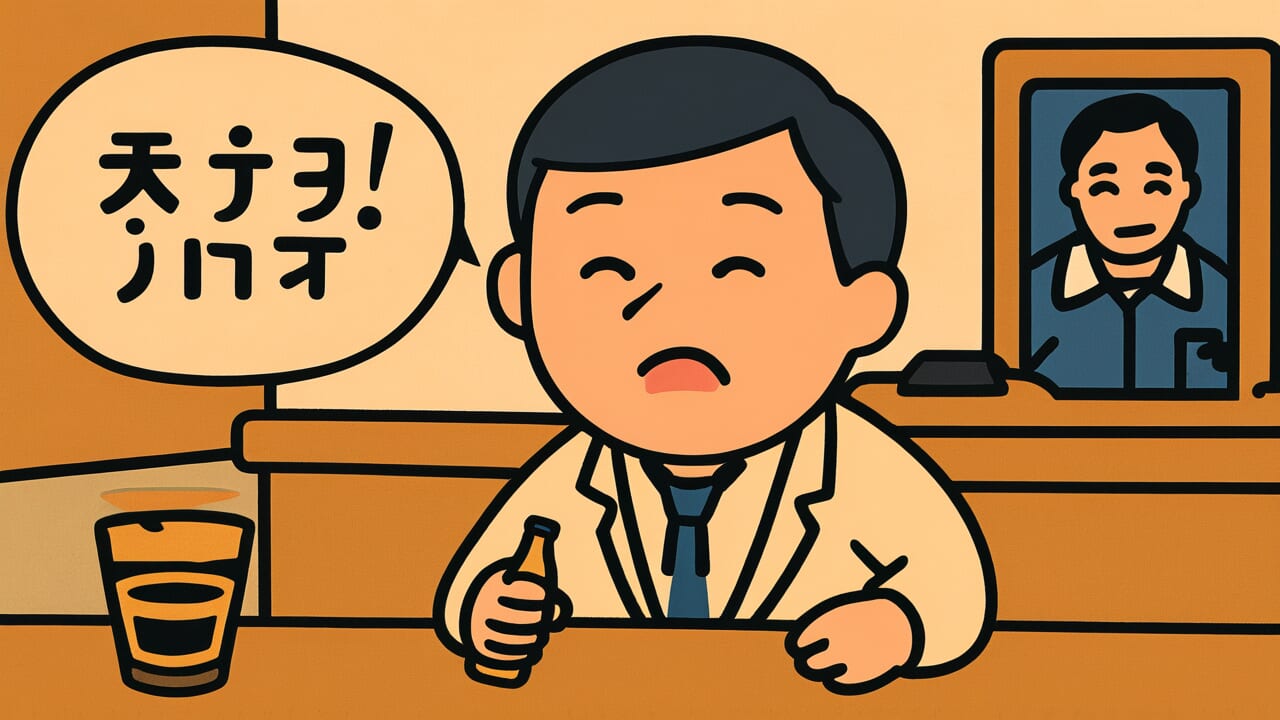How to Read “A light drunk doesn’t change one’s true nature”
Namayoi honshō tagawazu
Meaning of “A light drunk doesn’t change one’s true nature”
“A light drunk doesn’t change one’s true nature” means that even when drunk, a person’s fundamental character remains unchanged. The attitudes and behaviors shown while intoxicated are not newly created by alcohol. They simply reveal the true nature that was already there.
This proverb is used when observing how people behave at drinking gatherings. A kind person stays kind even when drunk. A short-tempered person becomes even more short-tempered.
The alcohol doesn’t change their personality. It just releases the natural qualities that reason normally keeps in check.
Today, this saying also serves as a warning: “Don’t blame alcohol for mistakes made while drinking.” Even if someone speaks harshly or acts violently when drunk, it’s not the alcohol’s fault.
Those elements already existed within that person. In other words, this proverb teaches that we must take responsibility for our actions even when intoxicated.
Origin and Etymology
No clear written records document the origin of this proverb. However, it’s believed to have been used since the Edo period. “Namayoi” refers to a state between tipsy and moderately drunk, before being completely intoxicated.
The birth of this proverb is deeply connected to Japanese drinking culture. During the Edo period, drinking gatherings were important occasions for deepening relationships.
People believed that behavior while drunk revealed a person’s true self.
The expression “honshō tagawazu” (true nature doesn’t change) is interesting. It means “one’s true nature doesn’t change even when drinking.” But it also implies “drinking reveals one’s true nature.”
In other words, the real personality normally controlled by reason comes to the surface through alcohol. Yet this isn’t a new personality—it’s the nature that was always there.
This proverb emerged from the sharp observations of our ancestors. They tried to see people’s true essence through the lens of alcohol.
In a culture that valued behavior at drinking gatherings, this lesson was passed down to help people develop better judgment of character.
Usage Examples
- He always cares about others when drunk. A light drunk doesn’t change one’s true nature—he must be a truly kind person.
- That person uses alcohol as an excuse, but a light drunk doesn’t change one’s true nature. I think their original personality is just showing.
Universal Wisdom
“A light drunk doesn’t change one’s true nature” conveys a deep truth: human nature doesn’t change easily. In daily life, we suppress our true feelings and personality according to our social roles and positions.
But when alcohol enters the picture, that suppression loosens. The real self we usually hide comes out.
This proverb has been passed down because it captures the essence of human observation. Everyone carries a gap between their public face and their true self.
You might act polite while feeling dissatisfied inside. You might be kind while actually just enduring. Our ancestors saw through this human duality at drinking gatherings.
Looking deeper, this proverb reveals an inescapable human fate: “True nature cannot be hidden.” No matter how much you pretend, your real self will eventually appear.
This happens not just at drinking parties, but when tired, cornered, or off guard. That’s why this proverb quietly teaches something important.
Polishing your true nature matters more than decorating your surface.
When AI Hears This
The human brain has a layered structure built through evolutionary history. The deepest part contains the limbic system inherited from reptilian times, governing instincts. The outer layer is the prefrontal cortex, responsible for rational judgment.
What’s interesting about alcohol is that it impairs the newer brain parts first.
When blood alcohol concentration reaches about 0.05 percent, prefrontal cortex activity drops by over 30 percent. This area is the command center for “socially appropriate behavior.”
It suppresses anger, hides true feelings, and brakes desires. Alcohol paralyzes this part first, allowing the normally suppressed limbic system to speak up.
The key point is this: behaviors that emerge when drunk aren’t “newly created.” They’re “always present but hidden.” The prefrontal cortex doesn’t create—it suppresses.
In other words, our daily life consists of instinct thinly coated with reason. Alcohol works like a solvent stripping away that coating.
Neuroscience tells us that the personality appearing when drunk is evolutionarily older and more fundamental—your more basic self.
Lessons for Today
This proverb teaches modern people the importance of polishing their inner self, not just arranging their surface behavior. Creating a good impression on social media or at interviews matters. But growing your true self matters even more.
Why? Because your true nature will inevitably show somewhere. Not just at drinking parties, but when tired, stressed, or facing unexpected trouble. The self that appears in those moments is your real self.
That’s why daily effort to face your own heart matters. Gradually let go of negative emotions like anger, arrogance, and coldness.
This isn’t easy. But if your true nature becomes kind and compassionate, you can be unashamed of yourself in any situation.
This proverb teaches the limits of surface decoration while also offering hope. True nature isn’t unchangeable—it can be polished over time.
Your choices today create your true nature tomorrow.



Comments